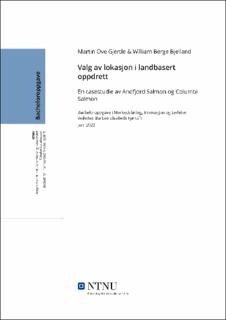| dc.contributor.advisor | Fjørtoft, Barbro Elisabeth | |
| dc.contributor.author | Gjerde, Martin Ove | |
| dc.contributor.author | Bjelland, William Berge | |
| dc.date.accessioned | 2022-07-20T17:19:32Z | |
| dc.date.available | 2022-07-20T17:19:32Z | |
| dc.date.issued | 2022 | |
| dc.identifier | no.ntnu:inspera:114615552:114619638 | |
| dc.identifier.uri | https://hdl.handle.net/11250/3007346 | |
| dc.description.abstract | Landbasert oppdrett vil være en ny måte å drive oppdrett på som er bedre egnet grunnet kontroll på de ytre faktorene. Det vil kutte store kostnader i form av avlusing, rømming og sykdom og de klarer derfor å konkurrere på pris. Oppgaven tar utgangspunkt i faktorene bak lokalisering av landbaserte oppdrettsanlegg hvor vi undersøker hva som er fordelene og ulempene med de ulike lokasjonene. Oppgaven er i hovedsak bygget på intervjuer med fagpersoner innen området hvor målet er å finne ut hvilke faktorer som bestemmer hvor man skal lokalisere seg. Er det best å være nært den eksisterende klyngen eller er det bedre å lokalisere seg nær konsumenten.
Valget av lokasjon avhenger av strategien til selskapene og danner konkurransefortrinn på ulike måter. Dersom man produserer laks nærme konsumenten vil man hovedsakelig spare kostnader på transport, men også i form av et produkt som andre vil betale mer for gjennom at det ferskere og mer miljøvennlig. Dersom man produserer laks i klyngen vil man oppnå agglomerasjonsfordeler gjennom korte veier i kommunikasjon, infrastruktur som allerede er på plass og man har muligheten til å bruke gjennomstrøms anlegg for å senke den biologiske risikoen samtidig som man også kan spare energikostnader. | |
| dc.description.abstract | It will be a better way to produce salmon by land-based fish-farming because of the control of external factors. Because of this, producers on land will cut costs in terms of de-lice, escapes and disease. Therefore, they will be able to compete in terms of price. This Paper will focus on the factors that drive the localization of land-based fish farming. We look at pros and cons with the various locations and the paper is based on interviews with experienced people within their respective fields. The goal of the paper is to have a greater understanding of which factors lead to their choice of location and whether it is better to be located within the cluster or close to the consumer.
The choice of location depends on the strategy of the companies and forms a competitive advantage in various ways. If you produce salmon close to the consumer, you will mainly save costs on transport, but also in the form of a product that others will pay more for through it being fresher and environmentally friendly. If you produce salmon in the cluster, you will achieve agglomeration benefits through short paths in communication, infrastructure that is already in place and you could use flow-through facilities to reduce the biological risk while also saving energy costs. | |
| dc.language | nob | |
| dc.publisher | NTNU | |
| dc.title | Valg av lokasjon i landbasert oppdrett | |
| dc.type | Bachelor thesis | |
